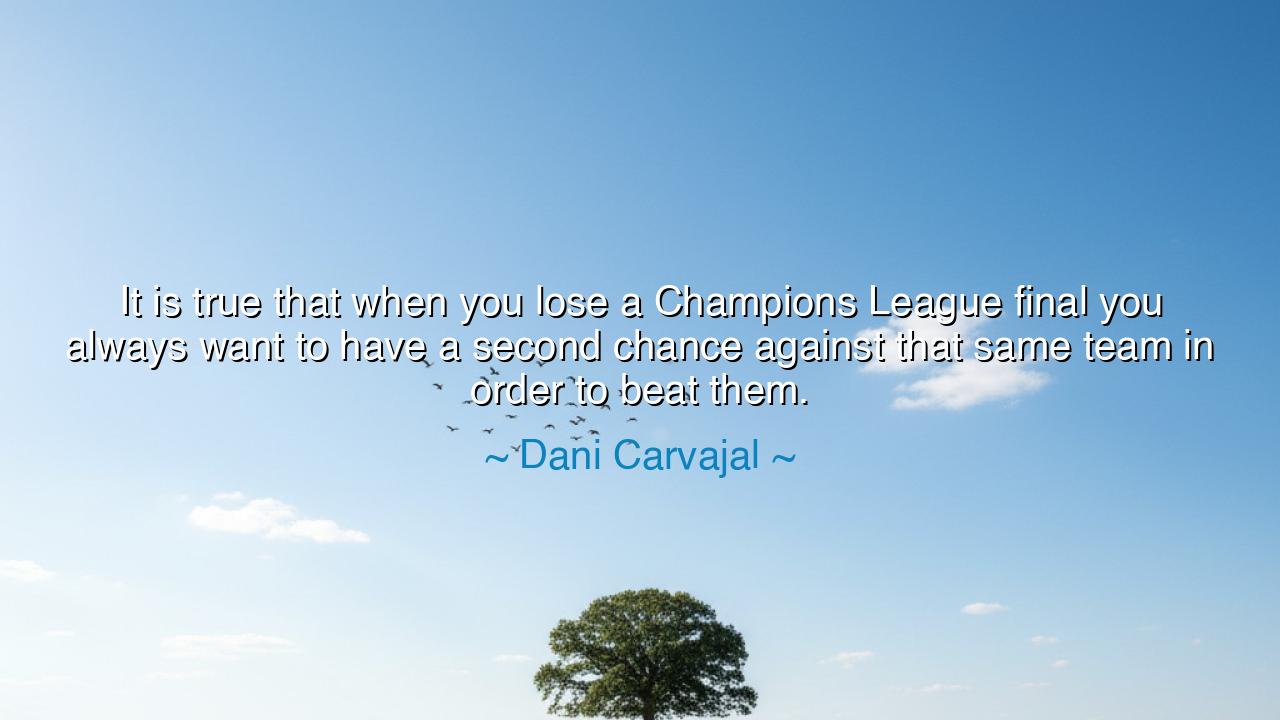
It is true that when you lose a Champions League final you always
It is true that when you lose a Champions League final you always want to have a second chance against that same team in order to beat them.






In the words of Dani Carvajal, "It is true that when you lose a Champions League final you always want to have a second chance against that same team in order to beat them," we encounter a reflection on resilience, redemption, and the deep human desire for justice. Carvajal, a celebrated footballer, speaks of the intense desire to right a wrong—the feeling of losing in a momentous battle, such as a Champions League final, and the yearning to face that challenge again in order to overcome it. This is not just about the love of competition but about the innate human need to seek balance after failure, to prove that the previous loss does not define us, but can be surpassed by our resolve and determination.
This pursuit of redemption is as old as human history itself. In ancient Greek mythology, the hero Heracles was tasked with completing the Twelve Labors—twelve impossible feats meant to atone for his past mistakes. Despite the immense challenges, Heracles was driven by a deep desire for redemption, to prove that he could rise above his past and become greater than he had been. Similarly, Carvajal’s reflection on wanting to face the same team again after a defeat embodies the idea that failure is not a final destination but a stepping stone toward growth. Just as Heracles sought redemption through his Labors, so too does Carvajal recognize that the desire to face defeat head-on is a vital part of the journey to personal and collective greatness.
Consider the story of Achilles, the hero of the Iliad, whose fate was shaped by both his victories and failures in battle. Achilles' rage at the beginning of the epic is rooted in his humiliation and dishonor at the hands of Agamemnon, yet his ultimate triumph comes when he faces the Trojan prince Hector in a final, decisive duel. Despite the losses he suffers, Achilles’ desire to face Hector again represents the ancient human quest to right wrongs, to avenge defeat, and to assert one’s honor through action. Similarly, Carvajal’s desire for a second chance against a team that has defeated him reflects this timeless human quest for vindication—the belief that defeat is only a temporary setback, and that victory, when it comes, will carry with it the weight of overcoming adversity.
In more recent history, Nelson Mandela’s struggle against the oppressive apartheid regime offers a profound example of resilience and the desire for redemption. Mandela was imprisoned for 27 years, but when he was released, he did not seek revenge against those who had wronged him. Instead, he sought reconciliation and equality, but his desire to fight for justice was undiminished. In his case, defeat was not the end, but rather the beginning of a new chapter—one where the struggle for freedom and equality became his life's work. Like Carvajal, Mandela understood that failure was not final, and that the true measure of a person lies in their ability to rise again, to take another swing at their goals and dreams.
In the world of sports, we can see this pattern repeated throughout history. The story of Michael Jordan is one such example. Jordan’s first retirement from basketball came after he failed to lead his team to a championship, and yet he returned with a vengeance. He did not merely come back to play; he came back to win, to prove that his earlier failures did not define his legacy. Jordan’s willingness to face those he had failed to defeat, and ultimately to overcome them, speaks directly to Carvajal’s words. Like Carvajal, Jordan’s competitive spirit was not about revenge, but about the need to prove, to himself and to the world, that failure is not a destination but a stepping stone on the way to something greater.
Carvajal’s reflection invites us to consider the nature of defeat and redemption in our own lives. When we face failure, whether in our personal ambitions, careers, or relationships, it is easy to be overwhelmed by regret or bitterness. But the true test of character lies not in avoiding failure, but in how we choose to respond to it. Like Carvajal, we must not shy away from the challenges we face but embrace them, knowing that a second chance—whether literal or figurative—is often where our true growth lies. The desire to face our failures, to overcome them, is not a sign of weakness but of strength, resolve, and vision.
The lesson from Carvajal’s words is clear: failure is not the end of the road but a temporary setback. It is in the face of defeat that we discover who we truly are, and it is from these moments that our greatest strength and growth arise. Whether it is in sports, business, or personal relationships, the desire to confront and overcome our past defeats is what propels us forward. Let us not dwell in failure but use it as the foundation upon which we build our next victory. By doing so, we embrace the timeless truth that greatness comes not from avoiding adversity, but from facing it with courage and determination.






AAdministratorAdministrator
Welcome, honored guests. Please leave a comment, we will respond soon